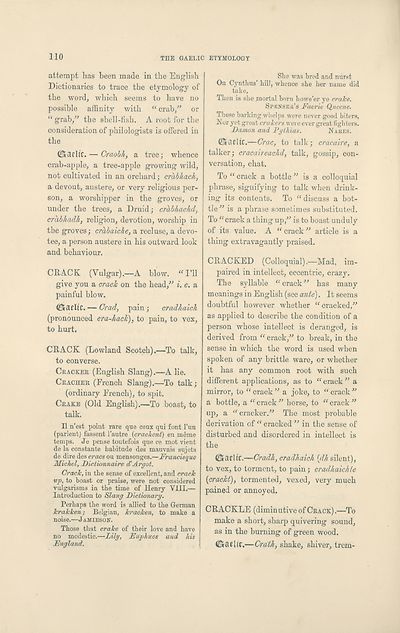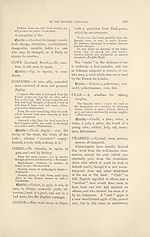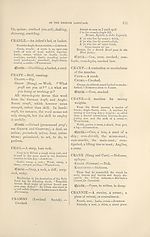Books and other items printed in Gaelic from 1871 to 1900 > Gaelic etymology of the languages of Western Europe, and more especially of the English and Lowland Scotch
(146) Page 110
Download files
Complete book:
Individual page:
Thumbnail gallery: Grid view | List view

110
THE GAELIC ETYMOLOGY
attempt has been made in the English
Dictionaries to trace the etymology of
the word, which seems to have no
possible affinity with “crab/’ or
“grab/’ the shell-fish. A root for the
consideration of philologists is offered in
the
(Karlic. — CraoLh, a tree; whence
crab-apple, a tree-apple growing wild,
not cultivated in an orchard; crabhack,
a devout, austere, or very religious per¬
son, a worshipper in the groves, or
under the trees, a Druid; crabhachd,
crabhadh, religion, devotion, worship in
the groves; crabaiche, a recluse, a devo¬
tee, a person austere in his outward look
and behaviour.
CRACK (Vulgar).—A blow. “I’ll
give you a crack on the head,” i. e. a
painful blow.
(fSilfltC. — Crad, pain ; cradhaich
(pronounced cra-hack), to pain, to vex,
to hurt.
CRACK (Lowland Scotch).—To talk,
to converse.
Cracker (English Slang).—A lie.
Cracher (French Slang).—To talk;
(ordinary French), to spit.
Crake (Old English).—To boast, to
talk.
II n’est point rare que ceux qui font 1’un
(parlent) fassent I’autre (crachent) en meme
temps. Je pense toutefois que ce mot vient
de la constante habitude des mauvais sujets
de dire deseracsou mensonges.—Francisque
Michel, JDictionnaire d’Argot.
Oracle, in the sense of excellent, and crack
vp, to boast or praise, were not considered
vulgarisms in the time of Henry VIII.—
Introduction to Slang Dictionary.
Perhaps the word is allied to the German
Jcrahken; Belgian, kracken, to make a
noise.—Jamieson.
Those that crake of their love and have
no modestie.—Lily, Fuphues and his
Fngland.
She was bred and nurst
On Cynthus’ hill, whence she her name did
take,
Then is she .mortal born howe’er ye crake.
Spenseu’s Faerie Queene.
These barking whelps were never good biters,
Noryet great crakers were ever great fighters.
Damon and Pythias. Nakes.
GritfltC.—Crac, to talk; cracaire, a
talker; cracaireachd, talk, gossip, con¬
versation, chat.
To “ crack a bottle ” is a colloquial
phrase, signifying to talk when drink¬
ing its contents. To “discuss a bot¬
tle” is a phrase sometimes substituted.
To “crack a thing up,” is to boast unduly
of its value. A “ crack ” article is a
thing extravagantly praised.
CRACKED (Colloquial).—Mad, im¬
paired in intellect, eccentric, crazy.
The syllable “ crack ” has many
meanings in English (see ante). It seems
doubtful however whether “cracked,”
as applied to describe the condition of a
person whose intellect is deranged, is
derived from “ crack,” to break, in the
sense in which the word is used when
spoken of any brittle ware, or whether
it has any common root with such
different applications, as to “crack” a
mirror, to “ crack ” a joke, to “ crack ”
a bottle, a “ crack ” horse, to “ crack ”
up, a “ cracker.” The most probable
derivation of “ cracked ” in the sense of
disturbed and disordered in intellect is
the
Gaelic.—Cradh, cradhaich [dh silent),
to vex, to torment, to pain; cradhaichie
[crackt), tormented, vexed, very much
pained or annoyed.
CRACKLE (dimin utive of Crack) .—To
make a short, sharp quivering sound,
as in the burning of green wood.
Gaelic,—Crath, shake, shiver, trem-
THE GAELIC ETYMOLOGY
attempt has been made in the English
Dictionaries to trace the etymology of
the word, which seems to have no
possible affinity with “crab/’ or
“grab/’ the shell-fish. A root for the
consideration of philologists is offered in
the
(Karlic. — CraoLh, a tree; whence
crab-apple, a tree-apple growing wild,
not cultivated in an orchard; crabhack,
a devout, austere, or very religious per¬
son, a worshipper in the groves, or
under the trees, a Druid; crabhachd,
crabhadh, religion, devotion, worship in
the groves; crabaiche, a recluse, a devo¬
tee, a person austere in his outward look
and behaviour.
CRACK (Vulgar).—A blow. “I’ll
give you a crack on the head,” i. e. a
painful blow.
(fSilfltC. — Crad, pain ; cradhaich
(pronounced cra-hack), to pain, to vex,
to hurt.
CRACK (Lowland Scotch).—To talk,
to converse.
Cracker (English Slang).—A lie.
Cracher (French Slang).—To talk;
(ordinary French), to spit.
Crake (Old English).—To boast, to
talk.
II n’est point rare que ceux qui font 1’un
(parlent) fassent I’autre (crachent) en meme
temps. Je pense toutefois que ce mot vient
de la constante habitude des mauvais sujets
de dire deseracsou mensonges.—Francisque
Michel, JDictionnaire d’Argot.
Oracle, in the sense of excellent, and crack
vp, to boast or praise, were not considered
vulgarisms in the time of Henry VIII.—
Introduction to Slang Dictionary.
Perhaps the word is allied to the German
Jcrahken; Belgian, kracken, to make a
noise.—Jamieson.
Those that crake of their love and have
no modestie.—Lily, Fuphues and his
Fngland.
She was bred and nurst
On Cynthus’ hill, whence she her name did
take,
Then is she .mortal born howe’er ye crake.
Spenseu’s Faerie Queene.
These barking whelps were never good biters,
Noryet great crakers were ever great fighters.
Damon and Pythias. Nakes.
GritfltC.—Crac, to talk; cracaire, a
talker; cracaireachd, talk, gossip, con¬
versation, chat.
To “ crack a bottle ” is a colloquial
phrase, signifying to talk when drink¬
ing its contents. To “discuss a bot¬
tle” is a phrase sometimes substituted.
To “crack a thing up,” is to boast unduly
of its value. A “ crack ” article is a
thing extravagantly praised.
CRACKED (Colloquial).—Mad, im¬
paired in intellect, eccentric, crazy.
The syllable “ crack ” has many
meanings in English (see ante). It seems
doubtful however whether “cracked,”
as applied to describe the condition of a
person whose intellect is deranged, is
derived from “ crack,” to break, in the
sense in which the word is used when
spoken of any brittle ware, or whether
it has any common root with such
different applications, as to “crack” a
mirror, to “ crack ” a joke, to “ crack ”
a bottle, a “ crack ” horse, to “ crack ”
up, a “ cracker.” The most probable
derivation of “ cracked ” in the sense of
disturbed and disordered in intellect is
the
Gaelic.—Cradh, cradhaich [dh silent),
to vex, to torment, to pain; cradhaichie
[crackt), tormented, vexed, very much
pained or annoyed.
CRACKLE (dimin utive of Crack) .—To
make a short, sharp quivering sound,
as in the burning of green wood.
Gaelic,—Crath, shake, shiver, trem-
Set display mode to:
![]() Universal Viewer |
Universal Viewer | ![]() Mirador |
Large image | Transcription
Mirador |
Large image | Transcription
Images and transcriptions on this page, including medium image downloads, may be used under the Creative Commons Attribution 4.0 International Licence unless otherwise stated. ![]()
| Permanent URL | https://digital.nls.uk/106563525 |
|---|
| Description | Out-of-copyright books printed in Gaelic between 1631 and 1900. Also some pamphlets and chapbooks. Includes poetry and songs, religious books such as catechisms and hymns, and different editions of the Bible and the Psalms. Also includes the second book ever published in Gaelic in 1631. |
|---|

